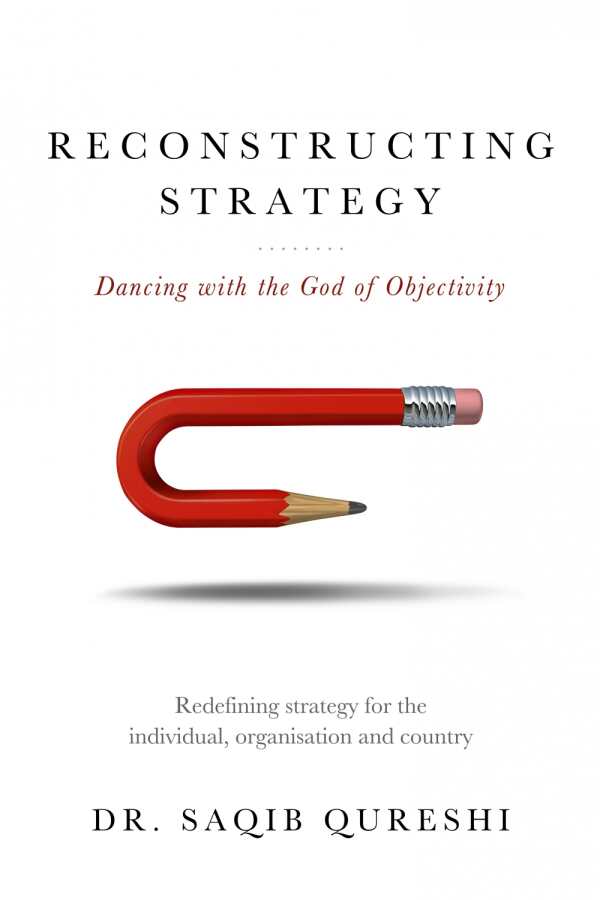It looks like you've stumbled upon a page meant to be read by our code instead of viewed directly. You're probably looking for this page.
Reconstructing Strategy
Dancing with the God of Objectivity
- 2015 INDIES Finalist
- Finalist, Career (Adult Nonfiction)
- 2015 INDIES Finalist
- Finalist, Political Science (Adult Nonfiction)
This perceptive book raises intriguing questions about modern-day strategies in business and life.
Saqib Qureshi, who has worked at a large international bank and a prominent consulting firm, lays out an ambitious objective for his book, Reconstructing Strategy: to redefine how to set strategy, whether it is for a person, organization, or even a country. His two main issues with modern-day strategists are that they overlook or ignore one’s self-identity in setting strategy, and that they also pay little (if any) attention to other disciplines that could impact strategic thinking.
Qureshi begins with a chapter that attempts to broadly define strategy, using input from others to create an accurate understanding of the term. He concludes that strategy “is about getting from where you are today to where you want to get to sometime in the future.” The author broadens the definition by identifying three types of strategies: life strategy, foreign policy strategy, and organizational strategy. While he explores the similarities and differences of all three, Qureshi suggests they all embrace “modern philosophy’s epistemological and methodological assumptions,” and that therefore, each of the three “ignores the impact of how we see ourselves or how each of us see the world today.”
Next, Qureshi spends considerable time discussing “the philosophical base” for strategy—a chapter that, while cogent, may make some readers glaze over because of its esoteric content. Perhaps more interesting is the author’s lively criticism of three modern-day strategists: Hans Morgenthau, Michael Porter, and Phillip McGraw. The author carefully dissects the writings of each of these three individuals, skewering them mercilessly for broadly ignoring other disciplines and for embracing objectivity without regard to the subjectivity of the strategist. For example, about McGraw’s seminal book, Self Matters, Qureshi writes, “The book’s embracing of objectivity is relentless. Further, Self Matters demonstrates little appreciation that we each have a role in seeing and understanding the reality that we engage, that we are partly responsible for how we see our situation today.”
The second half of the book focuses on the author’s belief in the importance of self-identity in setting strategy. In addition to making a strong case for the impact of self-identity on the strategic process, Qureshi includes some interesting sketches of specific individuals to demonstrate why self-identity is crucial. He tells the story of Jan Morris, a woman who was born a boy. Though challenging, Morris’s “gender journey” was ultimately successful and strategic, writes Qureshi, because of her ability to embrace a “deep inner self-identity.” Qureshi follows much the same approach when he discusses organizations and countries, employing several carefully chosen examples to highlight the essential nature of self-identity.
Reconstructing Strategy is written at a high intellectual level. As such, it is appropriate for strategists, academicians, and students, but is likely too advanced for the average reader. The book was extensively researched, with exhaustive footnotes and a multitude of sources. The author is a skilled writer, and his ability to combine his own viewpoint with relevant examples supporting his argument is impressive. For those with an interest in an enlightened and broad view of strategy, Reconstructing Strategy is sure to be a compelling book.
Reviewed by
Barry Silverstein
Disclosure: This article is not an endorsement, but a review. The publisher of this book provided free copies of the book and paid a small fee to have their book reviewed by a professional reviewer. Foreword Reviews and Clarion Reviews make no guarantee that the publisher will receive a positive review. Foreword Magazine, Inc. is disclosing this in accordance with the Federal Trade Commission’s 16 CFR, Part 255.
